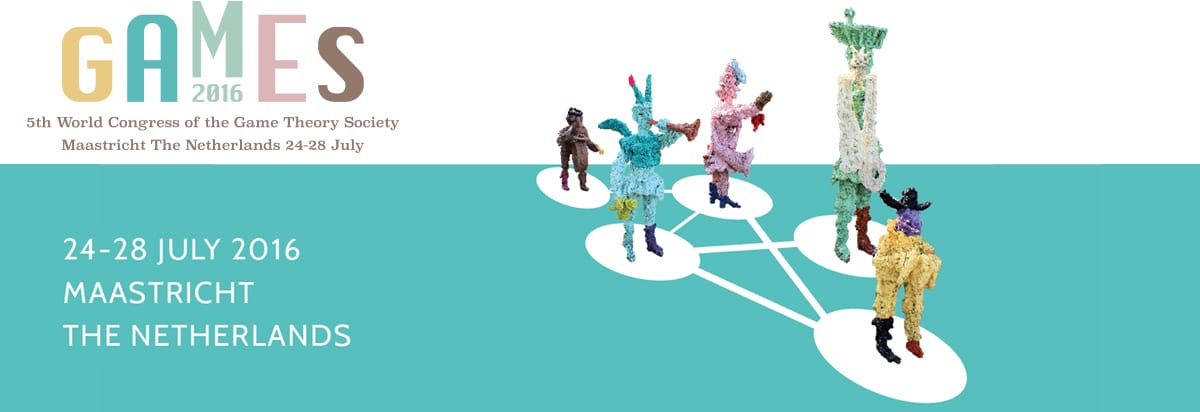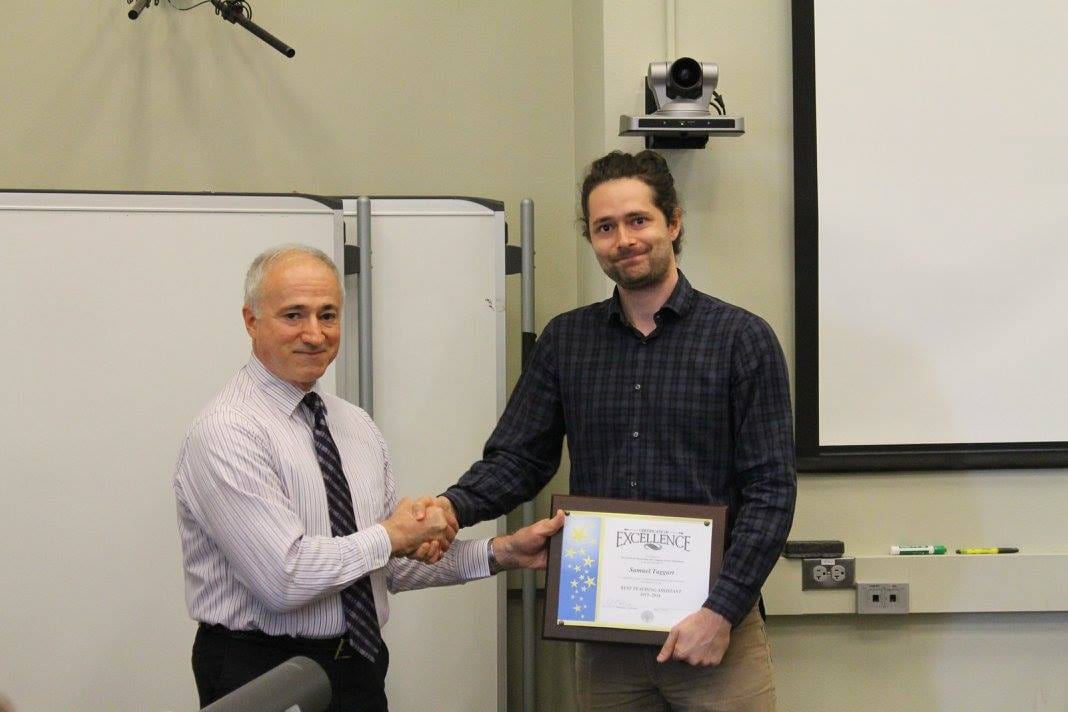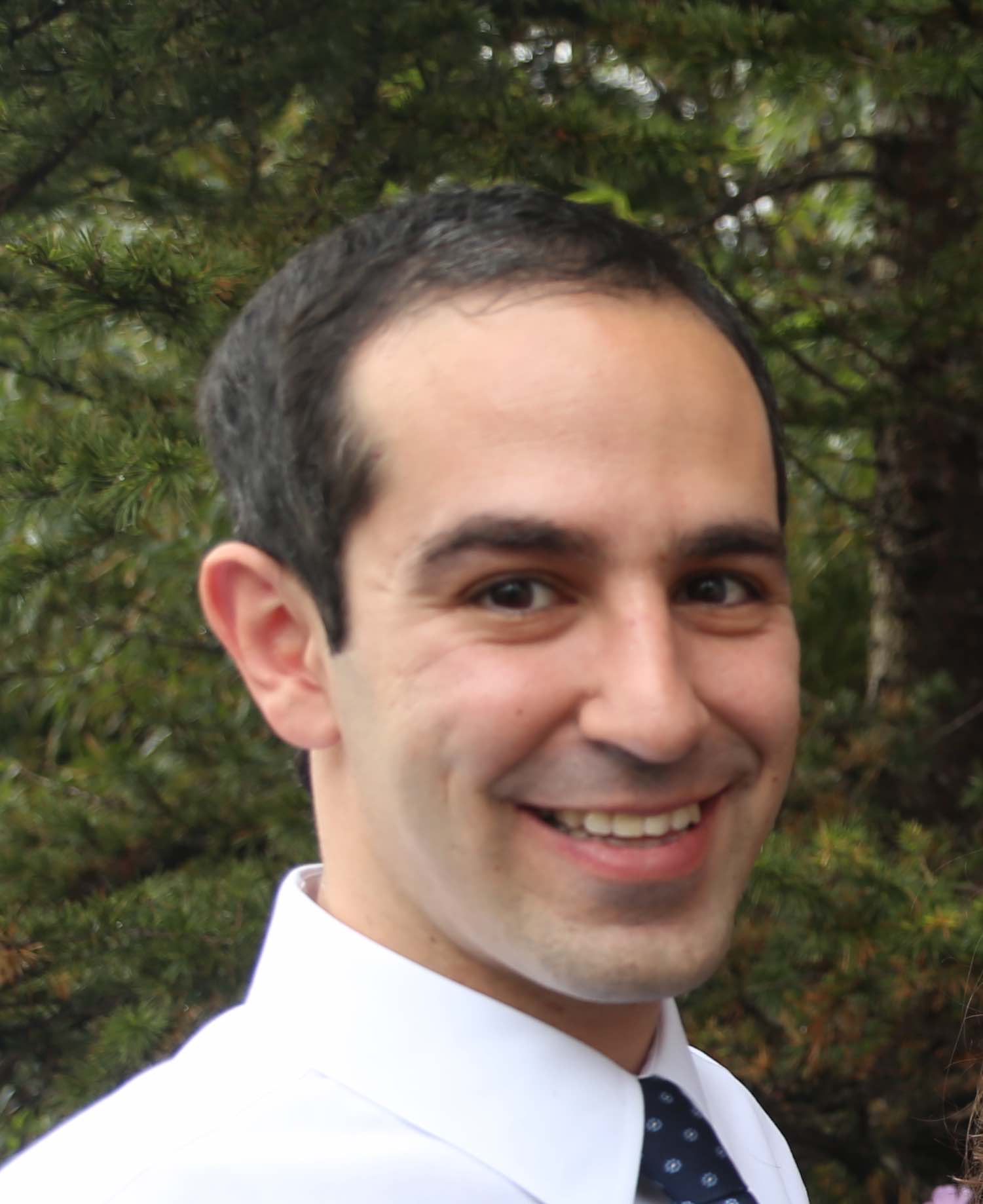The 2016 ACM Conference on Economics and Computation and the World Congress of the Game Theory Society (GAMES 2016) were colocated at Maastricht University in the medieval town of Maastricht, Netherlands in late July. The Northwestern theory group had an especially strong showing with seven papers presented and a public lecture! Brief summaries are given below.

Ph.D. student Manolis Pountourakis presented two papers. At GAMES, he presented his paper Optimal Auctions vs. Anonymous Pricing (joint with with coauthors Saeed Alaei, Northwestern Prof. Jason Hartline, Rad Niazadeh, and Yang Yuan). The paper proves that eBay’s Auctions and Buy-It-Now (posted pricings) are within at least an e = 2.718 factor of the revenue optimal auction (which may be asymmetric and very complicated). This is a worst-case bound that is quite difficult to prove; in practice the eBay’s sales mechanisms likely do much better. This paper previously appeared in FOCS 2015 and with this video of the talk. At EC, he presented Procrastination with Variable Present Bias (joint with coauthors Nick Gravin, Nicole Immorlica, and Brendan Lucier). Individuals attempting to complete a task often procrastinate, making plans and then failing to follow through. One well-known model of such behavioral anomalies is present-bias discounting: individuals over-weight present costs by a bias factor. This paper introduces a variant of this model where the bias factor varies across time, identifies a connection between the planning problem with variable present bias and optimal pricing, and uses this connection to bound the cost of procrastination.
Nima Haghpanah, a former Ph.D. student and now faculty member in the Economics Department at Penn State, presented two papers. At GAMES he presented Multi-dimensional Virtual Values and Second-degree Price Discrimination (joint with Northwestern Prof. Jason Hartline). This paper studies multi-dimensional mechanism design. It develops a method for solving for multi-dimensional virtual values, the pointwise optimization of which gives the optimal mechanism. It uses these virtual values to characterize the family of distributions where second-degree price discrimination (e.g., with a high- and low-quality version of a product) is not profitable. At EC he presented Sequential Mechanisms with ex-post Participation Guarantees (joint with Profs. Itai Ashlagi of Stanford and Constantinos Daskalakis). The paper identifies optimal and approximately optimal mechanisms in dynamic setting in which a seller and a buyer interact repeatedly. In contrast to standard settings, in this paper the outcomes of a mechanism must be acceptable to the buyer even after all uncertainty is resolved.
At the second Workshop on Algorithmic Game Theory and Data Science (a part of the EC program), Ph.D. student Sam Taggart presented Non-revelation Mechanism Design (joint with Northwestern Prof. Jason Hartline). This paper shows how to better design Bayes-Nash mechanisms, e.g., with winner-pays-bid or all-pay semantics, in a repeated environment by “linking decisions” across the repetitions. The designed mechanisms are asymptotically optimal with the number of repetitions that are linked.
At EC, Prof. Jason Hartline presented A/B Testing of Auctions (joint with Shuchi Chawla and Denis Nekipelov). This paper shows how the counter factual revenue of a mechanism B can be estimated from the equilibrium bids in a mechanism C which is the convex combination of mechanism A and B. For example, an auctioneer with multiple units can determine whether selling one unit or two units gives higher revenue by running the auction that probabilistically sells one or two units. The methods applies generally to position auctions to both winner-pays-bid and all-pay semantics.
Adjunct Northwestern Prof. Nicole Immorlica presented two papers. At the Workshop on Economics of Cloud Computing she presented On-demand or Spot? Selling the Cloud to Risk-averse Customers (joint with former Ph.D. student Darrell Hoy and Nikhil Devanur). In Amazon EC2, cloud resources are sold through a combination of the on-demand market, in which customers buy resources at a fixed price, and the spot market, in which customers bid for an uncertain supply of excess resources. This paper showed that such a dual market system improves upon key objectives when customers have heterogeneous risk attitudes: the welfare and revenue of its unique equilibrium is larger than that of spot markets alone and the efficiency is larger than only on-demand markets.

A slide from “Market Design without Money”
At a GAMES affiliated evening soirée with the Brightlands Young Professionals network Prof. Immorlica gave a Roy-Lichtenstein-themed public lecture entitled “Market Design without Money”. As a market-designer, a primary goal is to allocate resources to individuals in a way that maximizes the total value of the community for the allocation. Selling the resources is a great way to achieve this: if someone is willing to pay a high price for something, then they must have a high value for it as well. However, in many settings of interest, payments are infeasible. This could be due to repugnance, as in the assignment of public schools to children or cadaver kidneys to patients. Or perhaps the market technologies can not support financial transactions, e.g., users of an online review system like TripAdvisor may not have bank accounts linked to their user accounts. This talk explored using alternative incentives including risk, waiting time, and social status, in place of money to help optimize markets in such scenarios.
Great work to the presenters and coauthors of these papers!


 Sam Taggart
Sam Taggart Northwestern CS Theory and Economics Ph.D. student
Northwestern CS Theory and Economics Ph.D. student  TCS
TCS  Congratulations to former Northwestern CS Economics and Theory Ph.D. student
Congratulations to former Northwestern CS Economics and Theory Ph.D. student
Recent Comments